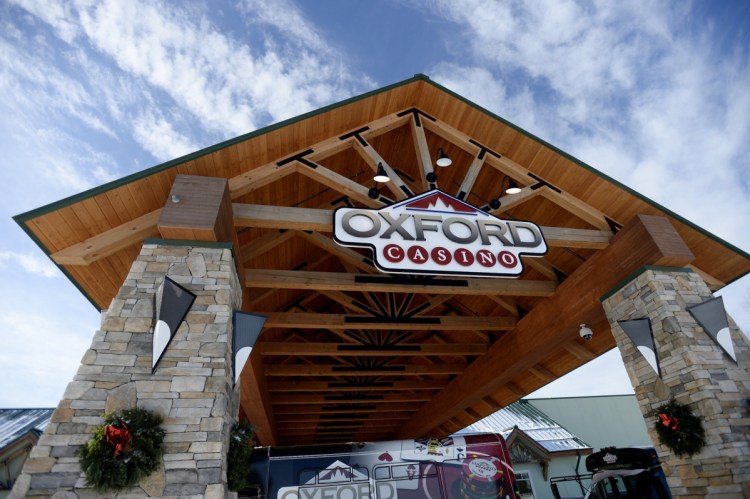Mainers could legally place bets on football, baseball, basketball and other professional and college games under several bills to sanction and regulate sports betting that are heading for debate in this session of the Legislature.
The bills offer a range of approaches to handling sports wagers. Some would give casinos in Bangor and Oxford permission to offer sports betting, while others would grant that permission to the state’s American Indian tribes. Other measures would establish regulations for placing bets online.
If any of the bills becomes law, Maine would be the second state in New England and the eighth in the country to legalize sports betting. States that have already done so include Nevada, Delaware, New Jersey, Rhode Island, Mississippi, West Virginia and Pennsylvania, as well as the District of Columbia.
About 30 other states have bills in the works, following a May 2018 U.S. Supreme Court ruling that overturned a federal law passed in 1992 that prohibited states from legalizing betting on sports.
“The general idea is to establish a regulatory structure for sports betting in Maine after the U.S. Supreme Court ruling this past spring,” Christine Kirby, a spokeswoman for Senate President Troy Jackson, D-Allagash, said in a statement. “It also gives the Gambling Control Board significant authority to regulate sports betting.”
COMPROMISE MEASURE LIKELY
Jackson is sponsoring two bills to regulate online and mobile gaming. Kirby said his legislation would, among other things, prohibit gambling on Maine collegiate teams, minor league teams, high school teams and certain other sporting events.
Whatever law Maine passes would almost certainly include a mechanism to pay for the regulatory system and generate revenue for the state through licensing fees or a tax.
It’s unclear how much is wagered on sports because most of the action before 2018 was underground and illegal. H2 Gambling Capital, a gambling research firm, estimates that under a legalized system, Americans could spend as much as $5 billion a year on sports bets by the year 2023, with about half those bets being placed with mobile devices. The betting volume is projected to grow to more than $7 billion by 2030.
The Maine bills have been given titles by legislative staff, but the actual text of the measures is still being written.
Rep. Benjamin Collins, D-Portland, sponsor of the bill aimed at helping Maine’s tribes, said it’s likely a compromise measure will emerge that involves casinos, off-track-betting parlors, the harness race industry and, hopefully, the tribes.
Collins said he believes sports betting would be a multimillion-dollar market in Maine, “but probably not in the tens of millions.” He said he is still in discussions with some of the tribes about pursuing gambling opportunities, which lawmakers have repeatedly rejected in previous legislative sessions.
“They still feel a little skeptical about that,” Collins said of the tribes’ interest in pursuing sports betting or other gambling ventures. “This is not an opportunity for them to make a ton of money but maybe a little bit.”
REGULATION FRAMEWORK IS GOAL
It’s against the law now to bet on sports contests in Maine, but prosecutions are rare and authorities most often pursue bookmakers rather than the individuals who place bets with them.

A player holds chips at a Blackjack table at Oxford Casino. Under several bills, Maine could be the second state in New England and the eighth in the country to legalize sports betting.
Just last week, Stephen Mardigan, a Portland man who authorities say was running what is believed to be one of the state’s largest illegal gambling operations, was sentenced to 15 months in federal prison by Chief U.S. District Judge Jon Levy for convictions of unlawful gambling, money laundering and filing a false tax return.
Court records show that investigators believe that Mardigan took in $9 million to $12 million over the course of 20 to 25 years, although his lawyers disputed those figures.
Court documents showed he took bets on sports games – college and pro basketball, college and pro football, baseball, professional hockey, stock car racing and golf tournaments. The documents say bets typically ranged from $30 to thousands of dollars, but two gamblers in particular wagered more than $4 million through Mardigan.
Milton Champion, executive director of the Maine Gambling Control Board, which regulates the casino industry, said sports betting is usually offered by casinos more as an additional amenity for guests. He said it does not typically generate large sums of money for operators.
Under Maine law the state shares in profits made by the casinos, taking in about $55 million a year in revenue.
Champion said last week he had not seen any specifics of the new bills but was standing by ready to help the Legislature craft any new law to regulate sports betting in Maine.
Sen. Louis Luchini, D-Ellsworth, sponsor of one of the sports betting bills, said his measure had not been drafted yet and he was still researching laws in other states to find a model for Maine.
“The goal would be to ensure there is an adequate regulatory framework for sports wagering, as it’s becoming legalized across the country,” Luchini said.
Scott Thistle can be contacted at 791-6330 or at:
sthistle@pressherald.com
Twitter: thisdog
Send questions/comments to the editors.



